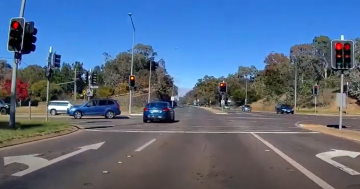
Parking and traffic offences are the most common infringements issued across the Territory. Photo: Michelle Kroll.
An inquiry investigating the impact of fines for minor offences on vulnerable people has heard police discretion depends on the officer and the “context”, with no way to track when police have decided not to issue a fine.
ACT Policing’s Family Violence and Vulnerable Persons Unit Acting Superintendent Dave Williams and corporate executive general manager Peter Whowell were among the stakeholders who appeared at the hearing, which is also looking into the sustainability of current alternative measures to fines, and how to maximise compliance with legislation.
In the ACT, fines are generally split into three categories: parking and traffic offences, failure to vote, and “other infringement notices”, which are classified in the Magistrates Court Act (1930) for offences such as breaches of work health and safety regulations, failure to register a dog, and failure to meet obligations under the long service leave scheme.
When police officers can issue a fine, they also have the option of giving a verbal warning, a caution or a diversionary measure such as a community program.
Mr Whowell said while officer training attempted to introduce consistency across the use of discretion, it was ultimately down to the individual.
“Discretion is inherently in the office of the constable,” he told the inquiry.
“Discretion is at the heart of the way we police.”
There’s no way to track the cases when officers use their discretion; however, there is a record if they issue a caution or diversion.
When asked if discretion was the default option for fines for vulnerable people, Act Supt Williams said it wasn’t that simple.
“I wish it were easy to default, but context is needed,” he said.
“We are also accountable for the times that we do [use discretion].”
He explained the seriousness of the offence, the impact of the offending on the community, and the impact on the individual and even on the officer when executing their duty were also taken into consideration and that the point of discretion was about the “context of the situation”.
Examples of vulnerable people could include those with financial issues, drug and alcohol issues, Aboriginal and Torres Strait Islander people, people with disabilities and those who speak English as a second language. In some cases, people need to self-identify as a vulnerable person to police officers.
Act Supt Williams said fines were often used as a deterrent rather than engaging in the judicial process, which he said was “obviously a much better option” in some cases than taking someone to court.
However, there were cases where discretion for minor offences wasn’t appropriate, such as if a person repeatedly offended or if safety was an issue.
“Sometimes the decision may be to commence the judicial process in the first instance so that the judiciary can put treatment around that person,” Act Supt Williams said.
“But those decisions aren’t taken lightly.”
When asked if more diversionary services were needed to help vulnerable people avoid fines, Act Supt Williams said while that could be part of the solution, they were voluntary.
“You’re relying on a sense of cooperation from [the person] … at any point, they can remove their consent,” he said.
“It’s really tricky with program delivery … it’s different between voluntary and court-imposed.”
Fines in the ACT can be paid through management plans with a minimum fortnightly payment of $10 available by entering an approved community work or social development program, or by seeking a waiver. In failing to vote, the fine is $20 if a reasonable excuse cannot be provided.
Under changes being implemented from February 2024, other finable offences under the Magistrates Court Act (1930) will have to be capable of being paid through an instalment plan or an approved program.
When courts issue a fine, they have to consider the person’s financial circumstances, among other factors.
If someone fails to pay a fine issued by ACT Policing, the process goes through Access Canberra and police are only notified if the fine is contested and goes to court.
The ACT Government’s submission to the inquiry noted that most infringement notices issued in the Territory could already be dealt with through flexible repayment arrangements or waived on the basis of hardship.
“Each scheme has its own processes in place to reduce hardship, with varying levels of complexity,” it stated.
“The most detailed hardship provisions and guidelines apply to parking and traffic infringements, which represent the vast majority of administrative penalties issued.”
It also noted the decriminalisation of possession of small amounts of some drugs would begin in October, reducing penalties from a possible jail sentence to a $100 penalty or taking part in an assessment and harm reduction session.





















